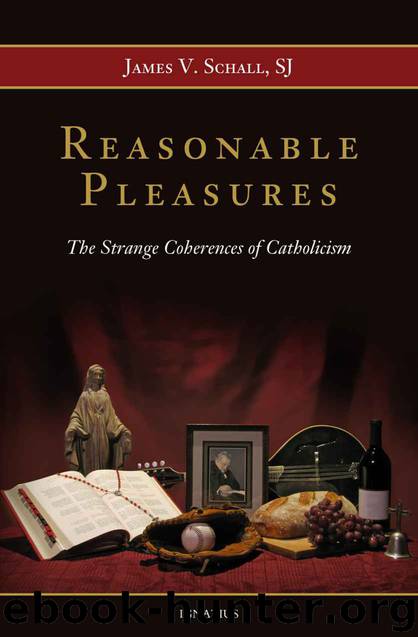Reasonable Pleasures: The Strange Coherences of Catholicism by James V. Schall

Author:James V. Schall [Schall, James V.]
Language: eng
Format: mobi
Tags: Spiritual & Religion
ISBN: 9781586177874
Publisher: Ignatius Press
Published: 2013-09-29T16:00:00+00:00
III
We might grant such logic but still insist: Why would a good God ever put us in a position wherein this possible hell was open to us? The answer is, briefly, that God had no other choice if He was going to create free beings capable of loving Him in the first place. If He chose not to create anything, which He was free to do, the issue of hell would never have come up. For it is quite clear that had there been no creation of cosmos, angels, or men, there would be no hell. But would this be an improvement?
Hell has nothing directly to do with God. It is an unintended, but necessary, consequence of creation itself. Hell does have something to do with what God was seeking to do in creation. Remember, hell arises out of realistic considerations of justice. God is also just—each is rendered his due. Justice questions concern beings that are free to be just or unjust. Hell has to do with the record of injustice that in fact exists in the world of rational and free agents in their relation to God and each other.
Saint Paul indicated to the Romans that the sufferings of nonrational beings were in fact related to the status of the rational beings (Rom 8:19-23). Essentially, God was not trying to create a free being that would justly go to hell. Rather, He created a free being that was capable of loving himself, other beings like himself, and God. Such a free being was capable also of rejecting such love, divine or human, because he was created to be free. Without this power of rejection, neither love nor damnation would be possible or conceivable.
Within this consideration, the issue of hell comes up. If any created, finite being, including man, was really free, it would be necessary that this being could reject the purpose for which he was created, ultimately God Himself. He could reject this purpose even if the purpose constituted objectively his own happiness. His rejection, however, would be posed in terms of a good. If he could make this rejection, then we have “invented” hell. Basically, hell, together with the immortality of the soul and the resurrection of the body, allows the free creature to live forever with his choice or definition of what is his good or purpose in being. Hell is the living with the consequences of his choice. Hell is not God’s purpose for him. God wishes every man to be saved, as Saint Paul said (1 Tim 2:4).
God will, of course, do everything that He can to call man to his created and transcendent purpose. But He cannot make the being, once He created it, not to be what it is, that is, free. Even God could not make something free but then change His mind about it once He saw what man would do with this freedom. The creation of man included allowing him to be free. The point is clearer from
Download
This site does not store any files on its server. We only index and link to content provided by other sites. Please contact the content providers to delete copyright contents if any and email us, we'll remove relevant links or contents immediately.
Resisting Happiness by Matthew Kelly(3337)
The Social Psychology of Inequality by Unknown(3018)
Day by Elie Wiesel(2781)
Designing Your Life by Bill Burnett(2740)
The Giving Tree by Shel Silverstein(2336)
Human Design by Chetan Parkyn(2068)
The Supreme Gift by Paulo Coelho(1962)
Angels of God: The Bible, the Church and the Heavenly Hosts by Mike Aquilina(1957)
Jesus of Nazareth by Joseph Ratzinger(1811)
Hostage to the Devil by Malachi Martin(1800)
Augustine: Conversions to Confessions by Robin Lane Fox(1769)
7 Secrets of Divine Mercy by Vinny Flynn(1741)
Dark Mysteries of the Vatican by H. Paul Jeffers(1707)
The Vatican Pimpernel by Brian Fleming(1699)
St. Thomas Aquinas by G. K. Chesterton(1632)
Saints & Angels by Doreen Virtue(1603)
The Ratline by Philippe Sands(1571)
My Daily Catholic Bible, NABRE by Thigpen Edited by Dr. Paul(1498)
Called to Life by Jacques Philippe(1475)
